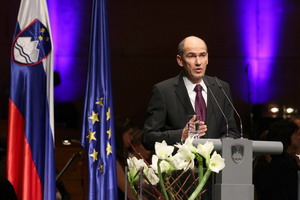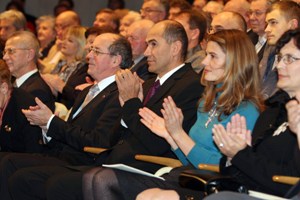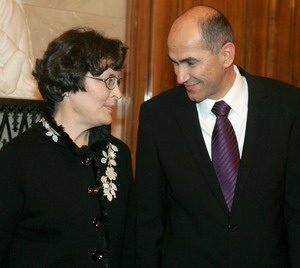The Prime Minister of the Republic of Slovenia, Janez Janša, was the honorary speaker at tonight's state's celebration on the occasion of World Human Rights Day in Cankarjev dom. On behalf of Slovenia he apologised to all surviving political prisoners who were persecuted here in the second half of the 20th century. "It was wrong what they did to you. You were right. Those who judged you and persecuted you acted wrongfully," said the PM, wishing that every citizen of the country would agree with this apology.

(Photo: Bor Slana/Bobo)
In his speech the PM stressed that, contrary to the period before 1990, the Republic of Slovenia is based on human rights. Human rights were a key concept of the Slovenian Spring and later adopted by all emerging associations and movements in the 1980s, making them the heart of their programme.
The theme of the celebration entitled 'Lost Memory' focused on the memory of political prisoners in Slovenia from 1945 to 1990, individuals and families, the tens of thousands who suffered greatly in the second half of the 20th century. The PM stressed that the country which emerged after the end of World War II, was not based on human rights. Despite the fact that the Universal Declaration on Human Rights was adopted by the UN General Assembly in 1948, political police arrested 6,985 people for political crimes, and a year later, when civilian societies implemented the Declaration's provisions, the political police, the UDBA, arrested as many as 8,762 people in Slovenia.
The PM explained that political repression at the end of World War II was not based on fighting the occupying forces, but that it was a revolution and class struggle, and therefore many courageous and upright people who dared to take risks, left Slovenia.

(Photo: Bor Slana/Bobo)
In his speech PM Janša also mentioned 'the erased' and the Roma. He said that after independence Slovenia granted as many as 200,000 citizenships to all those who wanted to regulate their legal status. Slovenia did not prevent anyone from obtaining citizenship or some other legal status in accordance with the law. He stressed that citizenship should not be granted to those who did not want it, adding that this was not a violation of human rights, but that some did not want to take advantage of the available opportunities and regulate their status in Slovenia. He said that the constitutional act drafted by the Government was an adequate solution to the problem of the erased, which will correct each injustice individually.
With regard to the Roma, the PM said that the rights of the Roma are included in the Constitution. He said that Slovenia has a special act on the Roma regulating the implementation of the rights of the Roma community, adding that countries with far larger Roma populations did not have such an act.

Immediately before the state ceremony, the PM attended a reception on the occasion of Human Rights Day organised by the Human Rights Ombudsman, Dr Zdenka Čebašek – Travnik (Photo: Kristina Kosec / Bobo)
The PM also mentioned current violations of human rights in Slovenia, particularly court back-logs. "We have yet to discover a way to ensure a judicial system which can issue rulings in real time," said the PM, adding that this is Slovenia's key task for the future. With regard to poverty and social exclusion, he said that this was not only the task of the government, but that also citizens can contribute to resolving this issue with solidarity. According to the PM, the issue of poverty must be seen in a wider context: "In recent years, Slovenia has heard serious warnings that we are too focused on ourselves, that we cannot see what happens elsewhere and that we do not participate in international development and solidarity aid campaigns." President Janez Drnovšek greatly promoted this view. In this respect, the PM said that the President's warning was valuable, and forecast that Slovenia would increase funds for international development aid.
 Speech by the Prime Minister
Speech by the Prime Minister